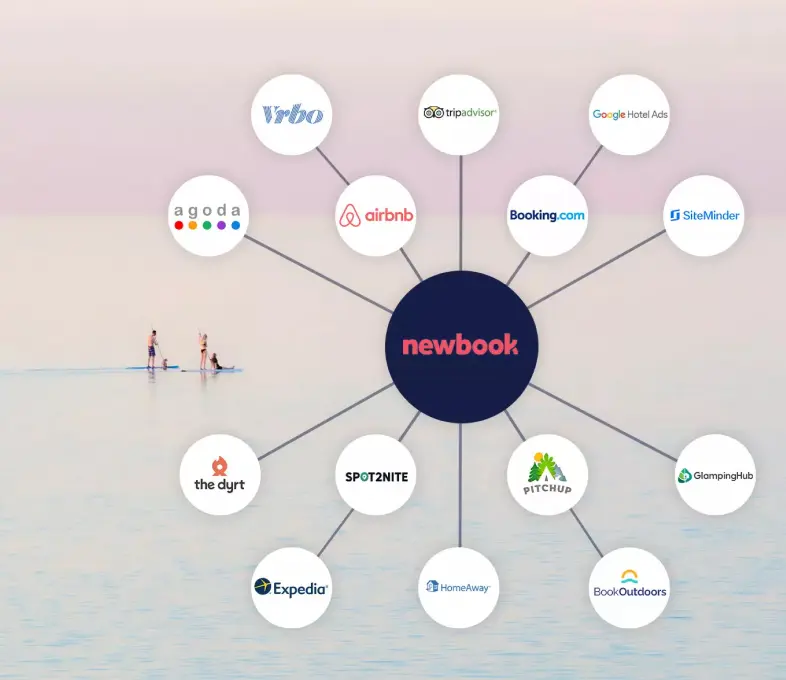
Ecotourism: a catchy-sounding word you may have heard tossed around in the hospitality and online spaces. But what exactly is ecotourism? And what does it take to implement for your hospitality business? The good news is that we’re here to help answer those questions and more, including why ecotourism is important and has potential benefits for you and your business.
So sit back, get your notebooks out, and prepare to learn—ecotourism class is in session.
Ecotourism Definition: What is Ecotourism?
Ecotourism isn’t just about travel—it’s about traveling responsibly. While traditional tourism might focus on sightseeing or luxury experiences, ecotourism revolves around protecting the environment and fostering authentic connections with local communities. This shift in travel preferences has gained momentum in recent years due to increasing awareness of environmental issues and a desire to contribute positively while exploring new destinations.
But you may still be wondering, “What is Ecotourism?”. When it comes down to it, an ecotourism definition looks something like:
Ecotourism is a form of travel that minimizes the negative impact on the environment while enhancing the well-being of local communities.
For vacation rental owners, adopting eco-friendly practices can make your property more attractive to the growing number of eco-conscious travelers. Those who adopt eco-friendly travel practices can easily implement changes such as:
- Offering eco-conscious amenities like biodegradable toiletries or solar-powered energy solutions
- Encouraging guests to engage with local businesses and support community initiatives
- Providing recycling options and promoting energy conservation in your rental
These small efforts can greatly impact your property’s appeal to eco-conscious travelers while contributing to a more sustainable future.
Ecotourism vs. Tourism: Key Differences and Benefits
What sets ecotourism apart from traditional tourism? The core distinction lies in the purpose of the traveler and the impact their journey has on the environment and local communities.
Traditional tourism often prioritizes convenience, comfort, and entertainment, with little regard for the ecological or social footprint it leaves behind. This type of travel can lead to:
- Resource depletion and pollution.
- Harm to local cultures and environments.
- Economic benefits focused more on larger corporations than local communities.
In contrast, ecotourism focuses on sustainability and encourages travelers to:
- Engage in low-impact travel that protects natural habitats.
- Support local economies and preserve cultural heritage.
- Promote environmental conservation for future generations.
By offering nature-based experiences and supporting sustainable practices in your rental property, you can attract guests who are passionate about responsible travel. Ecotourism’s benefits for vacation rental owners go beyond guest satisfaction—it’s about creating a positive, lasting impact on both the environment and the communities within and surrounding your property.
Why Ecotourism Matters for Hospitality: Sustainability and Growth
For vacation rental owners, embracing ecotourism isn’t just about following the latest trend—it’s about ensuring long-term success and adaptability in a rapidly evolving industry. Sustainability is no longer a “nice to have” feature; it’s becoming a central expectation for many modern travelers. As more people become aware of the importance of responsible travel, properties that embrace eco-conscious practices will stand out in the marketplace.
The benefits of ecotourism for hospitality businesses are extensive:
- Increased Market Appeal: More travelers are seeking eco-conscious properties. Highlighting your commitment to sustainability can set you apart from competitors.
- Lower Operational Costs: Implementing energy-saving technologies and reducing waste can lower your operating expenses in the long run.
- Positive Environmental Impact: By protecting the environment, you’re preserving the natural beauty that attracts guests in the first place.
Incorporating ecotourism practices can help secure the long-term growth of your business, aligning with modern hospitality trends while making a meaningful contribution to the environment.
Examples of Ecotourism: Showcasing Sustainable Travel
As more travelers seek sustainable and eco-friendly travel options, vacation rental owners can tap into this growing market by adopting ecotourism practices. Using Newbook to manage your property efficiently while implementing sustainability can attract eco-conscious guests and elevate your business. Let’s explore some ecotourism examples from Newbook’s client success stories highlighting how real-world properties embrace sustainable travel.
Ecotourism Examples: Highlighting Real-World Destinations and Projects
These examples showcase how vacation rental properties successfully integrate eco-friendly practices while maintaining a high standard of guest experience.
Tathra Beach Eco Camp, Australia
A shining example of ecotourism success can be found at Tathra Beachside, a popular holiday park that has transformed from a simple beachside attraction into a hub of sustainable tourism and community support. Located on the beautiful coast of New South Wales, Tathra Beachside offers more than just sandy beaches and family-friendly activities—it provides an ecotourism experience that enriches the local economy and promotes environmental stewardship.
Originally a council-owned park, Tathra Beachside is now a thriving business offering a variety of social activities like outdoor movies, trivia nights, free BBQs, and even circus workshops. This eco-conscious park draws beach lovers and families while maintaining a strong connection to the natural environment.
Since joining the Newbook family in 2014, Tathra Beachside has fully embraced a range of tech-driven features to improve guest experience and streamline operations. The park uses Newbook’s property management system, channel manager, and automated booking engine, all of which help it stay ahead of the curve in hospitality trends.
Tathra Beachside’s commitment to sustainability extends beyond daily operations. During a severe weather disaster, the park leveraged Newbook’s automated communications SMS feature to send real-time evacuation alerts to all guests, ensuring everyone—including pets—was safely accounted for. Their quick thinking and use of technology were praised by emergency response teams and won them the Innovation Award at the 2019 Tourism Innovator Awards.
Tathra Beachside’s innovative use of technology in times of crisis has set a benchmark for others in the industry. Their success demonstrates the potential for vacation rental businesses to thrive by combining ecotourism principles with smart technology solutions, like those offered by Newbook.
eBook: 5 Powerful Ways to Use Automated SMS
“We made an additional $7000 in one month by using SMS Late Check-Outs.” Find out how you can too!


BIG4 Ingenia Holidays Queenscliff Beacon
Nestled in the National Marine Park of Queenscliff, Victoria, BIG4 Ingenia Holidays Queenscliff Beacon has built a reputation for sustainable travel, attracting both domestic and international travelers with its eco-friendly practices and beachside charm. The family-owned caravan park has been a beloved destination since 1970, with 68% of guests returning or visiting through referrals. Their commitment to preserving nature while offering a top-tier vacation experience is evident through their adoption of Newbook’s paperless initiatives, reducing paper usage by 95% through email and SMS correspondence, paperless check-ins, and digital compendiums.
As leaders in the eco-tourism space, BIG4 Beacon has successfully integrated dynamic pricing and revenue management solutions through Newbook, resulting in a 13.7% revenue increase. They’ve also reduced operational overheads by cutting credit card merchant fees by 41%, which has allowed them to reinvest profits into new facilities like luxury villas and a popular kids’ activity program. Their dedication to sustainability and continuous innovation was recognized when they were named runners-up at the 2019 Tourism Innovator Awards.
By embracing Newbook’s technology and prioritizing eco-friendly practices, BIG4 Ingenia Holidays Queenscliff Beacon continues to thrive as an ecotourist destination, providing memorable and sustainable experiences for travelers worldwide.
How You Can Implement Ecotourism Practices in Your Rental
Inspired by these ecotourism examples, you too can make a positive impact by introducing sustainable practices into your vacation rental. Implementing eco-friendly changes enhances your guests’ experience, supports conservation efforts, and strengthens the local community. Here are some thoughtful ways you can start:
- Energy Efficiency: Reducing your property’s energy consumption is a significant step toward sustainability. Install solar panels to harness renewable energy or switch to energy-efficient appliances like LED lighting and low-flow water fixtures. Encourage guests to conserve energy by providing simple tips, such as turning off lights and air conditioning when not in use.
- Eco-Friendly Amenities: Offering biodegradable toiletries and swapping plastic products for reusable alternatives, like glass water bottles or cloth shopping bags, can significantly reduce waste. Providing clearly labeled recycling bins and compost options can also encourage guests to minimize their environmental impact during their stay.
- Water Conservation: To reduce water use, consider upgrading to water-efficient faucets, showerheads, and toilets. In areas prone to drought, you can also collect rainwater for gardening and outdoor use. Adding signage that promotes mindful water usage can further engage guests in sustainable practices.
- Support Local Communities: Partnering with local businesses and organizations strengthens the economy and enhances your guests’ connection to the region. Recommend eco-tourism activities such as guided nature walks, wildlife tours, or cultural experiences that align with sustainable travel principles. Guests will appreciate the opportunity to immerse themselves in authentic, responsible tourism experiences.
- Sustainable Landscaping: Opt for native plants in your landscaping to reduce the need for watering and chemical fertilizers. A sustainable garden or outdoor space can also create a peaceful retreat for guests while promoting biodiversity and reducing your environmental footprint.
By adopting these eco-friendly practices and using Newbook to manage your property efficiently, you can offer your guests a memorable and sustainable experience. With Newbook’s tools, you can seamlessly manage bookings, implement contactless check-ins, and communicate eco-conscious values to your guests. These changes will set your rental apart in the competitive vacation market and contribute to the broader goals of conservation and responsible tourism.
More bookings, more often with our built in channel manager
Newbook is your all in one property management software. Talk to us today to learn how you can inprove operations and increase bookings for your business.


Ecotourism Activities: Creating Sustainable Experiences for Guests
As travelers increasingly seek sustainable and immersive experiences, vacation rental owners have an excellent opportunity to incorporate ecotourism activities into their offerings. But first, what exactly is ecotourism? The ecotourism definition emphasizes responsible travel that conserves the environment, supports local communities, and fosters cultural awareness. Adopting this concept can help vacation rental owners differentiate their properties, attract eco-conscious guests, and contribute to long-term environmental sustainability.
Here are some ways you can offer ecotourism activities that create memorable, sustainable experiences for your guests:
| Ecotourism Strategy | Description |
| Nature-based activities | Offer guided nature walks, wildlife-watching tours, and eco-friendly water activities like kayaking or snorkeling to help guests connect with the environment and promote conservation. |
| Sustainable transportation | To help reduce guests’ carbon footprint, provide bicycles or e-bikes, install EV charging stations, and share local public transit options. |
| Support local culture and community | Recommend local markets and cultural activities, and collaborate with sustainable businesses to immerse guests in authentic, eco-friendly experiences. |
| Eco-conscious practices at your property | Provide biodegradable toiletries, encourage energy and water conservation, and use eco-friendly cleaning products for a greener guest experience. |
| Volunteering opportunities | Connect guests with local conservation projects or community volunteer programs for a meaningful and positive impact on the environment and local communities. |
How Hospitality Businesses Can Develop Ecotourism Activities
As more travelers prioritize sustainability, the benefits of ecotourism become clear—both for the environment and hospitality businesses. Offering ecotourism activities attracts eco-conscious guests and contributes to environmental conservation and local community support. For vacation rental owners, developing partnerships with local communities, nature reserves, and conservation projects is a great way to enhance the guest experience while promoting sustainable tourism.
Here’s how you can start:
- Partner with local communities: Offer cultural experiences like cooking classes, craft workshops, or historical tours, and collaborate with local artisans for market tours or farm visits.
- Collaborate with nature reserves: Arrange eco-tours, guided hikes, and wildlife conservation programs, such as sea turtle releases or habitat restoration.
- Support conservation projects: Provide volunteer opportunities such as tree planting or beach cleanups, and offer guests the option to donate to local environmental causes.
- Use technology: Use platforms like Newbook to manage eco-friendly excursions and volunteer programs and promote the benefits of ecotourism to your guests.
Is Ecotourism Good or Bad? Understanding the Pros and Cons

As the demand for sustainable travel grows, many vacation rental owners may wonder if ecotourism is beneficial. While ecotourism significantly benefits local economies and the environment, it has potential challenges, such as over-tourism and “greenwashing.” Let’s explore ecotourism’s advantages and potential pitfalls and how you can navigate them effectively as a property owner.
Analyzing The Potential Benefits And Challenges Of Ecotourism
Ecotourism offers many benefits for property owners, travelers, and the planet. However, like any form of tourism, it also presents challenges that must be addressed.
Benefits of ecotourism can include:
- Supports environmental conservation efforts.
- Boosts local economies by supporting small businesses and creating jobs.
- Fosters cultural exchange and understanding between visitors and local communities.
Challenges of ecotourism include:
- Risk of over-tourism in sensitive areas, leading to environmental degradation.
- Potential for “greenwashing,” where businesses falsely market themselves as eco-friendly without making real changes.
- Higher upfront costs for implementing sustainable practices, such as eco-friendly infrastructure or renewable energy sources.
The Positive Impact Of Ecotourism On Local Economies And The Environment
One of ecotuorism’s most significant benefits is its positive impact on local communities and the environment. By focusing on sustainable practices, ecotourism encourages responsible travel that preserves natural resources and fosters economic growth.
You can look at the positive economic impacts of ecotourism in two ways:
- Boosting local economies: Ecotourism often promotes local businesses, from hiring local guides to sourcing goods and services from nearby suppliers. This generates revenue for the community and creates job opportunities for locals.
- Environmental preservation: Ecotourism activities, like wildlife observation or nature walks, help raise awareness of environmental issues and contribute to conservation efforts. Funds generated through ecotourism can be reinvested in preserving habitats, wildlife, and natural landmarks.
Potential Risks Of Over-Tourism Or “Greenwashing” In Ecotourism, And How Hospitality Businesses Can Avoid These Pitfalls
Despite the positive impacts, ecotourism has risks, such as overtourism and greenwashing. Overtourism occurs when too many visitors flood an area, leading to environmental damage and strain on local resources. Greenwashing is when businesses market themselves as eco-friendly without taking meaningful actions to reduce their environmental impact.
To avoid these pitfalls, hospitality businesses can use strategies outlined in the table below.
| Strategy | Description |
| Limit visitor numbers | Use room booking software to control guest numbers and reduce the impact on local environments. |
| Stay transparent | Ensure real practices back eco-friendly claims. Be clear about steps to reduce your property’s environmental footprint, like energy-saving initiatives or sustainable materials. |
| Promote responsible tourism | Educate guests on preserving local ecosystems and respecting local cultures. Encourage ecotourism-aligned activities, such as supporting local markets and avoiding harmful wildlife interactions. |
By understanding the benefits of ecotourism and proactively addressing its challenges, vacation rental owners can create sustainable travel experiences that benefit their guests, the environment, and the local community.
How Hospitality Businesses Can Adopt Ecotourism Practices
As a vacation rental owner, implementing ecotourism practices appeals to environmentally conscious travelers and benefits your property and the local community. Transitioning your business toward more sustainable practices may seem daunting, but breaking it down into manageable steps can help make the process smoother. Here’s a guide on how hospitality businesses can incorporate ecotourism.
Steps for Transitioning Your Hospitality Business Toward Ecotourism
Adopting ecotourism practices doesn’t have to be overwhelming, and it offers a range of long-term benefits for your business and the environment. By making gradual changes focusing on sustainability and local engagement, you can attract eco-conscious travelers while reducing your property’s environmental footprint.
Below are practical steps to help transition your hospitality business toward ecotourism and take advantage of this growing travel movement.
Step 1: Reducing Energy and Water Consumption
The first step toward adopting ecotourism is to minimize energy and water usage. Reducing resource consumption not only benefits the environment but can also lower operational costs over time, and such examples include:
- Install energy-efficient appliances: Switch to energy-saving light bulbs and appliances to reduce electricity usage.
- Use water-saving fixtures: Incorporate low-flow toilets and showers to help conserve water. You can also install water recycling systems for landscaping.
- Renewable energy: Where possible, consider using renewable energy sources like solar panels.
Step 2: Offering Eco-Friendly Accommodation and Services
Ensuring your eco-conscious accommodation options can enhance the guest experience while minimizing your environmental impact. Consider:
- Eco-friendly amenities: Offer biodegradable toiletries, reusable water bottles, and locally sourced materials.
- Sustainable cleaning practices: Use eco-friendly cleaning products and encourage guests to reuse towels and linens during their stay.
- Eco-conscious design: If building or renovating, consider sustainable architecture that incorporates energy-efficient materials and natural ventilation.
Step 3: Partnering With Local Communities and Conservation Organizations
Building partnerships with local communities and conservation groups is key to ecotourism. These collaborations create opportunities for guests to engage with the local culture and contribute to conservation efforts.
These collaborations should include two elements:
- Local experiences: Partner with local artisans, tour guides, and businesses to offer authentic cultural experiences.
- Conservation projects: Encourage guests to participate in volunteer activities like tree planting or wildlife preservation programs.
Creating an Ecotourism Checklist To Ensure That Your Business Meets Sustainability Standards

To stay on track, create a sustainability checklist to evaluate your property’s eco-friendly efforts regularly.
Here are some sustainability ideas that you can incorporate into your checklist:
1. Energy Efficiency
- ☐ Use renewable energy sources (e.g., solar, wind, hydro) for electricity where possible.
- ☐ Install energy-efficient lighting (LED bulbs) and appliances.
- ☐ Use smart thermostats and motion sensors to regulate heating, cooling, and lighting.
- ☐ Provide guests with options to reduce energy consumption, such as opting out of daily linen changes.
2. Water Conservation
- ☐ Install low-flow toilets, faucets, and showerheads to minimize water use.
- ☐ Use rainwater harvesting systems for non-potable water needs (e.g., irrigation, cleaning).
- ☐ Implement greywater recycling for landscape irrigation and other non-drinking purposes.
- ☐ Educate guests on water-saving practices during their stay (e.g., shorter showers, reusing towels).
3. Waste Management
- ☐ Set up recycling and composting programs throughout the hotel.
- ☐ Eliminate single-use plastics (e.g., plastic straws, bottles, and packaging).
- ☐ Provide guests with reusable items (e.g., water bottles, shopping bags, and bathroom amenities in refillable containers).
- ☐ Partner with local vendors to reduce packaging and support a circular economy.
4. Sustainable Food & Beverages
- ☐ Source local, organic, and seasonal ingredients for your restaurant and bar.
- ☐ Offer a plant-based menu or eco-friendly food options to reduce your carbon footprint.
- ☐ Reduce food waste by tracking and adjusting inventory and portion sizes and donating excess food to local charities.
- ☐ Use compostable or reusable packaging for takeaway meals.
5. Eco-Friendly Guest Experiences
- ☐ Offer nature-based activities (e.g., hiking, wildlife tours, cultural experiences) that support local conservation efforts.
- ☐ Partner with local communities to create authentic, responsible tourism experiences.
- ☐ Provide educational materials on local ecosystems and how guests can minimize their impact.
- ☐ Organize volunteer opportunities for guests to participate in local conservation or sustainability projects.
6. Eco-Certifications & Transparency
- ☐ Pursue recognized eco-certifications (e.g., Green Key, EarthCheck, LEED) to verify your sustainability efforts and demonstrate social responsibility to your guests.
- ☐ Regularly audit your environmental practices and set measurable sustainability goals.
- ☐ Provide transparent information on your website about your sustainability initiatives and how guests can contribute.
- ☐ Train staff on sustainability best practices to ensure consistent and effective implementation.
7. Local Community Engagement
- ☐ Support the local economy by hiring local staff and sourcing products and services from local businesses.
- ☐ Promote local artisans by offering locally made products in your gift shop.
- ☐ Invest in community development projects, such as education or healthcare, to give back to the local population.
- ☐ Encourage guests to respect local cultures and ecosystems by following responsible travel guidelines.
8. Sustainable Transportation
- ☐ Offer bike rentals, shuttle services, or electric vehicle (EV) charging stations for guests.
- ☐ Encourage guests to use public transportation or carpooling options when available.
- ☐ Use fuel-efficient or electric vehicles for hotel-related transportation needs.
- ☐ Provide information on eco-friendly travel routes and transportation options in the area.
9. Biodiversity and Conservation
- ☐ Maintain native plants and trees in landscaping to support local wildlife and reduce water consumption.
- ☐ Avoid the use of chemical pesticides and fertilizers that harm local ecosystems.
- ☐ Implement policies to protect wildlife, such as banning plastic bags that harm marine life or avoiding harmful tourism practices.
- ☐ Collaborate with local conservation organizations to protect endangered species and habitats.
Make Ecotourism Part of Your Strategy
When it comes to managing the details of your ecotourism business, platforms like Newbook can simplify your operations while enhancing guest experiences. From paperless check-ins to automated surveys and sustainable integrations, you’ll have the tools you need to grow your business sustainably. So why not take the next step? By adopting eco-friendly practices and leveraging technology, you can position your rental as a leading destination for responsible travel.
Ready to implement ecotourism practices in your vacation rental? Contact us today to see how Newbook can help you make your business more sustainable while maximizing your bookings!
Your all-in-one, online booking system
Newbook is your all in one online booking system. Talk to us today to learn how you can improve operations and increase booking for your business.


